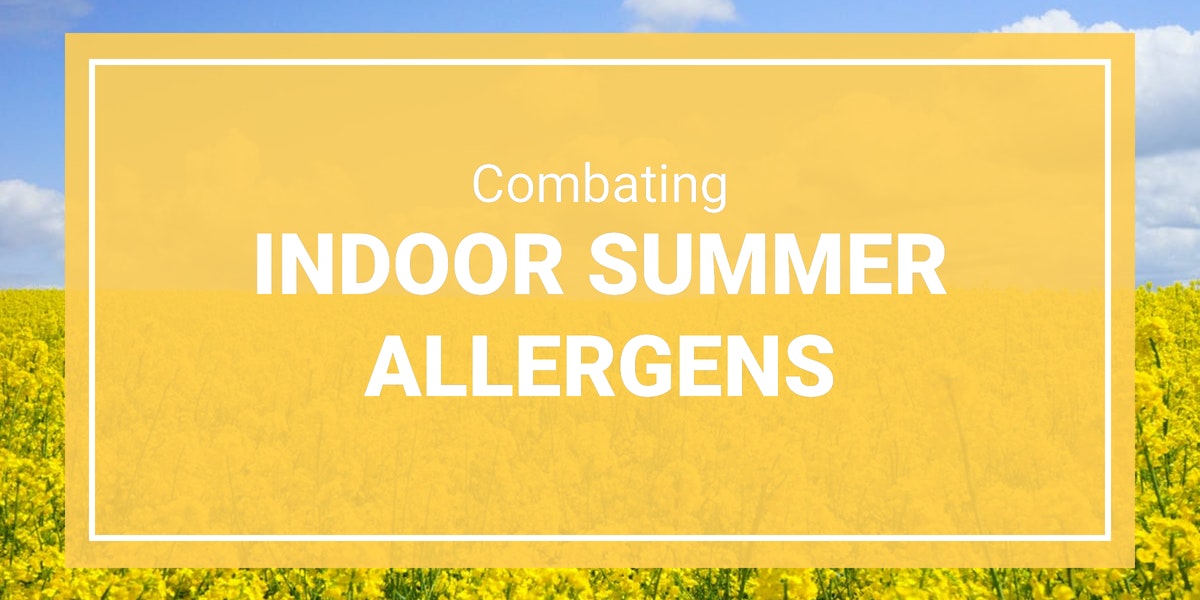Summertime allergens--pollen from trees, flowers, and grass--will wreak havoc on the health and productivity of students, faculty, and office workers alike.

The Effects of Summertime Allergens
Indoor summertime allergens--typically outdoor pollen and dust tracked in on peoples' shoes--represents a significant challenge for facilities managers, school administrators, and business owners concerned with occupant health, safety, and productivity.
The effects of summertime allergens on building occupants range from headaches to heart disease and cancer, as well as contributes to upticks in absenteeism and workplace injuries.
The challenges are even more pronounced for any of the 26 million Americans suffering from asthma.
According to CleanLink;
The 26 million asthma sufferers in the U.S. face more significant problems.
Poor indoor air can reduce the quality of life for asthmatics by exacerbating symptoms that can lead to missed days at school or work, asthma attacks, emergency room visits, and hospital admissions.
Just how bad is asthma in the United States?
According to Sanitaire Commercial;
Every day, asthma results in 40,000 missed school or work days, 30,000 asthma attacks, 5,000 emergency room visits, 1,000 hospital admissions and 11 deaths.
Indoor Air Quality and Occupant Performance
Indoor air quality has an inverse causal-effect on occupant health and performance--the better the IAQ, the better the measurable performance in students and office workers.
Conversely, sub-standard IAQ negatively impacts occupant cognitive functions and comfort, ultimately resulting in degraded output quality, increased health issues and absenteeism, as well as decreased profits.
According to ASHRAE;
IAQ directly impacts occupant health, comfort, and work performance.
People in buildings frequently report discomfort and building-related health symptoms, and sometimes develop building-related illnesses.
In recent decades, significant and substantial research has been conducted on the nature, extent, and causes of these comfort and health effects and scientific studies have determined that these health effects and discomfort are associated with characteristics of buildings, HVAC systems and the indoor environment.
In contrast, providing superior IAQ can improve health, work performance, and school performance, as well as reduce health care costs, and consequently be a source of substantial economic benefits.
Carpet Facts
- The average carpet can accumulate several pounds of dirt per year.
- Germs, such as the norovirus, and bacteria, such as salmonella, can survive on the carpet for a month, sometimes longer.
- Kawasaki Syndrome has been tentatively tied to the toxic chemicals found in carpet cleaners.
- Most people don't vacuum their carpet correctly, which increases the spread of allergens.
- When properly cleaned, carpets can reduce the airborne allergen count by trapping it in the fibers.
Source:
Cleaning Measures to Reduce the Impact of Summertime Allergens
As we've demonstrated, carpets can quickly become soiled and play host to several germs and bacteria, in addition to common allergens, if not correctly cared for.
Additionally, using toxic cleaning products as opposed to those certified by the Environmental Working Group as safe can lead to serious, lifelong health issues.
To reduce the summertime allergen count and improve the indoor air quality of your facility, as well as protect the health and safety of building occupants:
- Use air purification systems, such as commercial HEPA filters in the HVAC system.
- Vacuum carpets, rugs, and walkway mats every day with an Asthma and Allergy Foundation of America (AAFA) certified asthma & allergy friendly® vacuum.
- Have the carpets deep cleaned by a professional carpet cleaning or janitorial company and insist that they only use chemicals certified as safe for use by the EWG.
- Use microfiber cloths when dusting, and microfiber brooms and mops when cleaning hard floors, and;
- Depending on the building, either increase air flow via the environmental control system or by opening a window early in the morning to reduce humidity.
Takeaway
Indoor allergens increase during the summertime due to increases in foot traffic and the production of pollen and the spread of dust.
Improperly servicing carpets can increase the health risks to building occupants exponentially, contributing or leading to severe health issues, lost profits, lower grades, and increased absences.
Alternatively, a professionally serviced carpet and hard floor, when environmentally-safe chemicals are used, has been shown to increase occupant performance, comfort, and wellbeing.
If you would like to learn more about the advantages of professional carpet cleaning and environmentally safe deep cleaning services, or if you would like to schedule a free, no-obligation onsite evaluation of your facilities cleaning and infection control requirements, contact us today for a free quote!
In Bakersfield CA, call (661) 437-3253
In Fresno CA, call (559) 206-1059
In Valencia CA, or Santa Clarita CA, call (661) 437-3253

